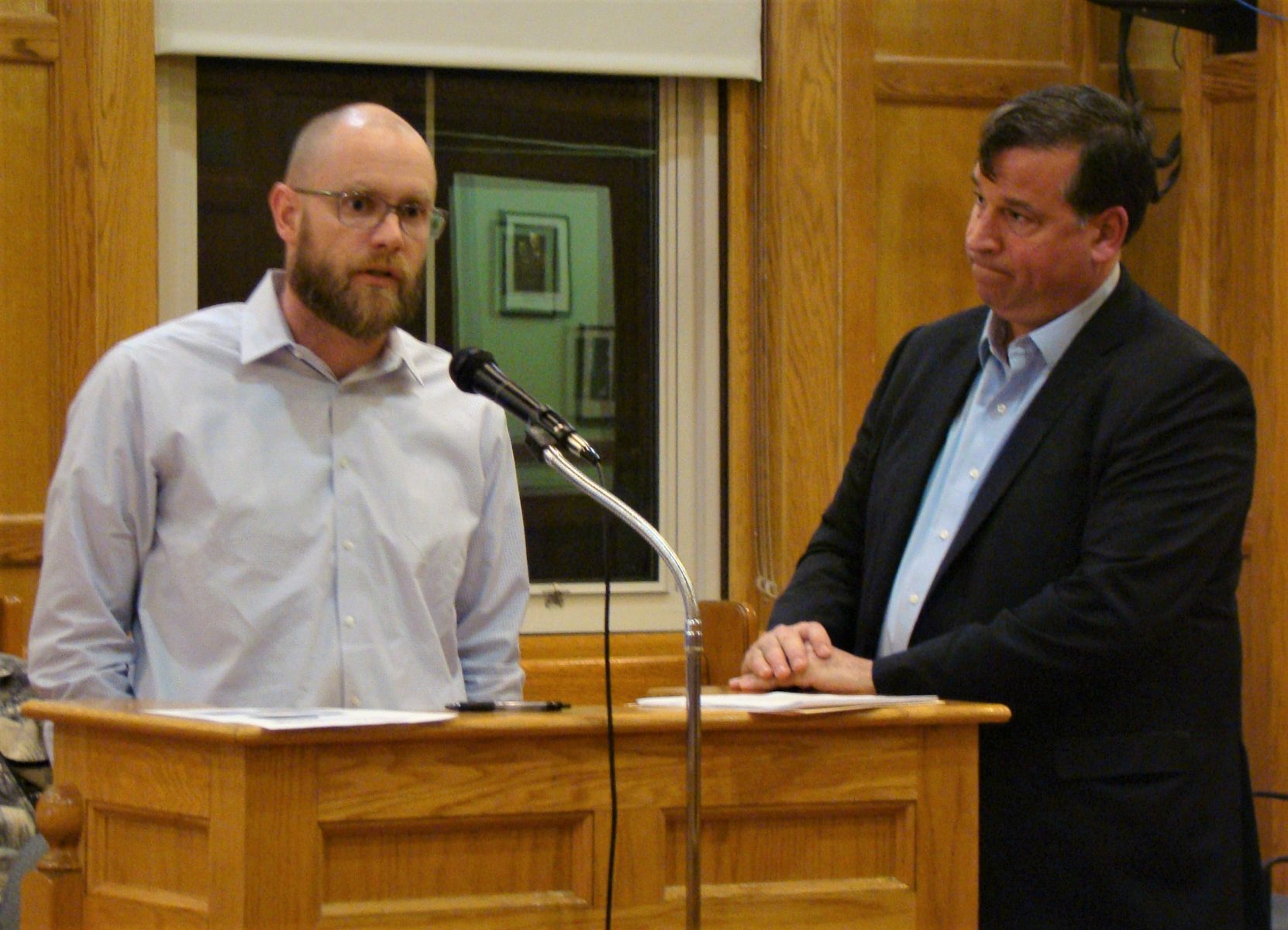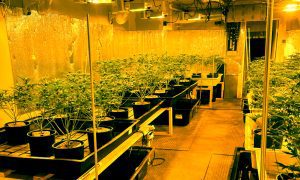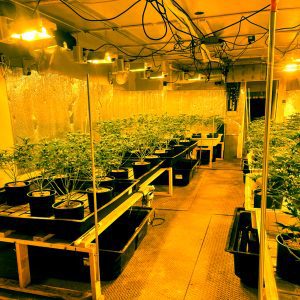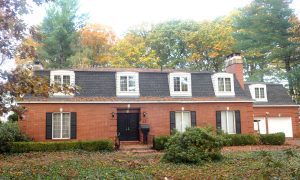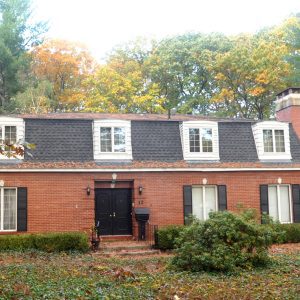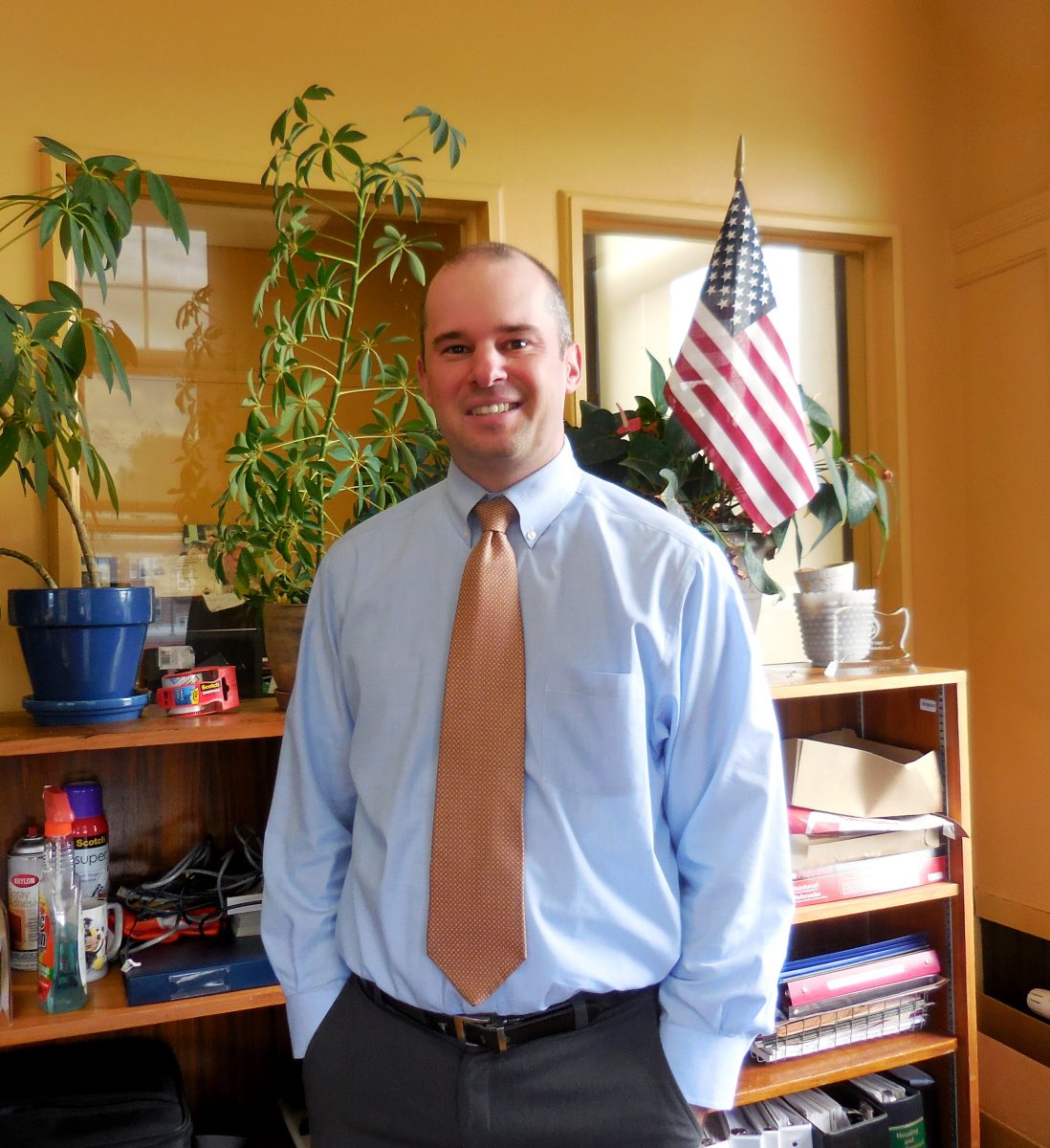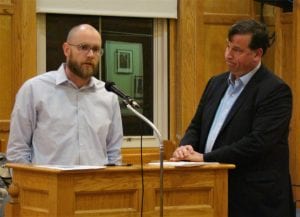
Rob Levesque of R. Levesque Assoc . and consultant Anthony Parrinello present a marijuana cultivator application to the Planning Board on Tuesday. (Photo by Amy Porter)
WESTFIELD –A consultant for a business seeking a Site Plan and Special Permit from the Planning Board for a cannabis cultivation facility faced nearly two hours of questioning on Tuesday, before a vote was postponed in order to get a legal opinion on wording of proposed conditions.
Rob Levesque of R. Levesque Assoc. presented the application for the proposed cannabis cultivation facility at 798 Airport Industrial Road. Levesque said the proposal is for alteration and reuse of existing light industrial buildings for cultivation, which he said is an allowable use in the Business B zoning district. The site lies within the Barnes Aquifer Water Resource Protection district, and is owned by the Oleksak Revocable Trust. Abutting properties are zoned both Business B and Industrial A.
“A lot of you were here for the expansion of the additional buildings on the site,” Levesque said, adding that the proposed facility does not require a lot of parking, will have few employees, and a lot of security for the indoor production of marijuana. The hours of operation would be 8 a.m. to 8 p.m., and some nights, five to six days a week, with monitoring on other days.
Levesque said one building would contain growing and drying areas as part of the production, and the second building would have a significant flowering area for cultivation. He also detailed a security plan for the proposed facility, and said the signage would be non-existent apart from the name for deliveries.
Levesque said there would be air purifying devices used for odor control. He said the applicant responded to the Planning Board comments regarding the aquifer, and said by state law, no pesticides are permitted in a cannabis facility. He also said they will try to reuse and conserve water as much as possible in the growing process.
Anthony Parrinello, who introduced himself as an advisor and consultant to the applicant, Borbon Consulting Group, said there is a Residential A property within 175 feet of the building, triggering the need for a Special Permit, but the owner was present and had no objections to the proposal.
Planning Board chair William Carellas said he was “struggling hard” with the application, due to a soccer field located within 120 feet of the facility where kids play games all week long. He said he had been in proximity to a public cannabis facility, and said the smell of marijuana was “pervasive.”
Parrinello said he is in the business, and owns two cultivation facilities, one in Stowe, MA and the other in Manchester, NH, where he admitted he had some issues with odor in the older building. He said here the odor control will be a closed, loop system utilizing no outside air, which he said can wreak havoc by introducing pathogens on the plants. He also said no inside air is released to the outside, and that carbon filters would be scrubbing the air, and re-releasing it back into the facility. He said there would also be high-tech scrubbers in the HVAC system which shoot out hydrogen peroxide molecules that attach to and neutralize the air molecules.
Parrinello said if they were to enter the room, “cross the threshold,” they would smell cannabis. “The buildings are tight. In my experience, I don’t see any impact on kids playing soccer,” he said.
In response to more questions, Parrinello said the flowering room would be self-contained, and each room of the operation would have its own handling system. He said any cannabis has to be in containers for transport, including from one room to another; and there are very stringent packaging policies, which include an air tight bag, rubber tote with latch and gaskets, creating an air-tight container.
“Also recognize, the state requires air quality mitigation efforts,” Parrinello said.
In response to another question, he said there would be a continuous harvest, each with an average four-month growing cycle; harvesting one room at a time.
In response to a question from Planning Board member Raymond St. Hilaire regarding plant waste, Parrinello said it would be shredded and co-mingled with dirt and other organic materials, and unusable. He said the plants would be from seed, and grown in dirt.
Regarding trucks, he said their vehicles would be simple unmarked transit vans, and they would get supplies, including agricultural products such as grow mix and cleaning supplies delivered “like any other business.”
Member Cheryl Crowe asked about water waste, being that the business is on top of the aquifer.
Levesque said a mechanical engineer would design the system. Processing water would need to be handled and scrubbed, and normal water would go into the septic system or sewer. He said they had not yet determined which system, septic or sewer that they would use.
Parrinello said scrubbing water can be expensive. He said the business would try to recycle the water, and would purchase a system from outside contractors, which he expected would recapture 60% of the water. He also said there would be no herbicides or pesticides use. He said they can’t call themselves organic because the federal government doesn’t recognize the business, “but we are.”
Crowe asked if they had designed the process for the water system yet, and Parrinello said they had not spent the money yet.
“In order to get a license to operate, you need a place to do that. This is the first step for the license,” Levesque said. He said then the process begins with the state, and all of these areas will be dealt with by the state. He said processed water has to be handled very specifically, and cannot be released. He said a copy of the plan could be provided to the board when they submit it to the state.
Planning Board members then continued to question the odor control, given the proximity of the active soccer field. Parrinello assured them they would not want to broadcast their presence, and added that the odor is not toxic, there would be no burning on site, and would be more of a nuisance if detected.
Member Robert Goyette asked if they would be comfortable purchasing an olfactory meter that Parrinello had described, saying it could monitor odors.
Several conditions on the application were discussed by the board, including zero odor at the property line, use of organic fertilizer, and generic Aquifer conditions. Goyette said he would like to see them purchase the olfactory meter. Another condition asked for contact information for the business to be readily available if any problems arise.
St. Hilaire asked whether as a condition they could say that noise level be at the residential level.
Levesque said a special permit had previously been issued for the site, and that had not been a condition. He said there are specific decibels allowed in different distract.
Carellas asked for a clarification from City Planner Jay Vinskey on what they were approving. “We’re voting to approve or not approve with no concrete plans, basically a conceptual plan.”
Vinskey said there are several state requirements, and the board was taking more of a zoning level look at the plan.
The board agreed to postpone the vote until the next meeting, in order to get a definition from the Law Department on zero odor at the property line.
Carellas asked for a sense of where the members were leaning, in order to be fair to the applicant. Several members said they didn’t like the location, but could not see a reason to deny the permit. Several members said they were learning towards not approving the permit, but could change their minds.
Carellas said they had 90 days to vote to this. “Whatever we vote, has to be defendable,” he said.

